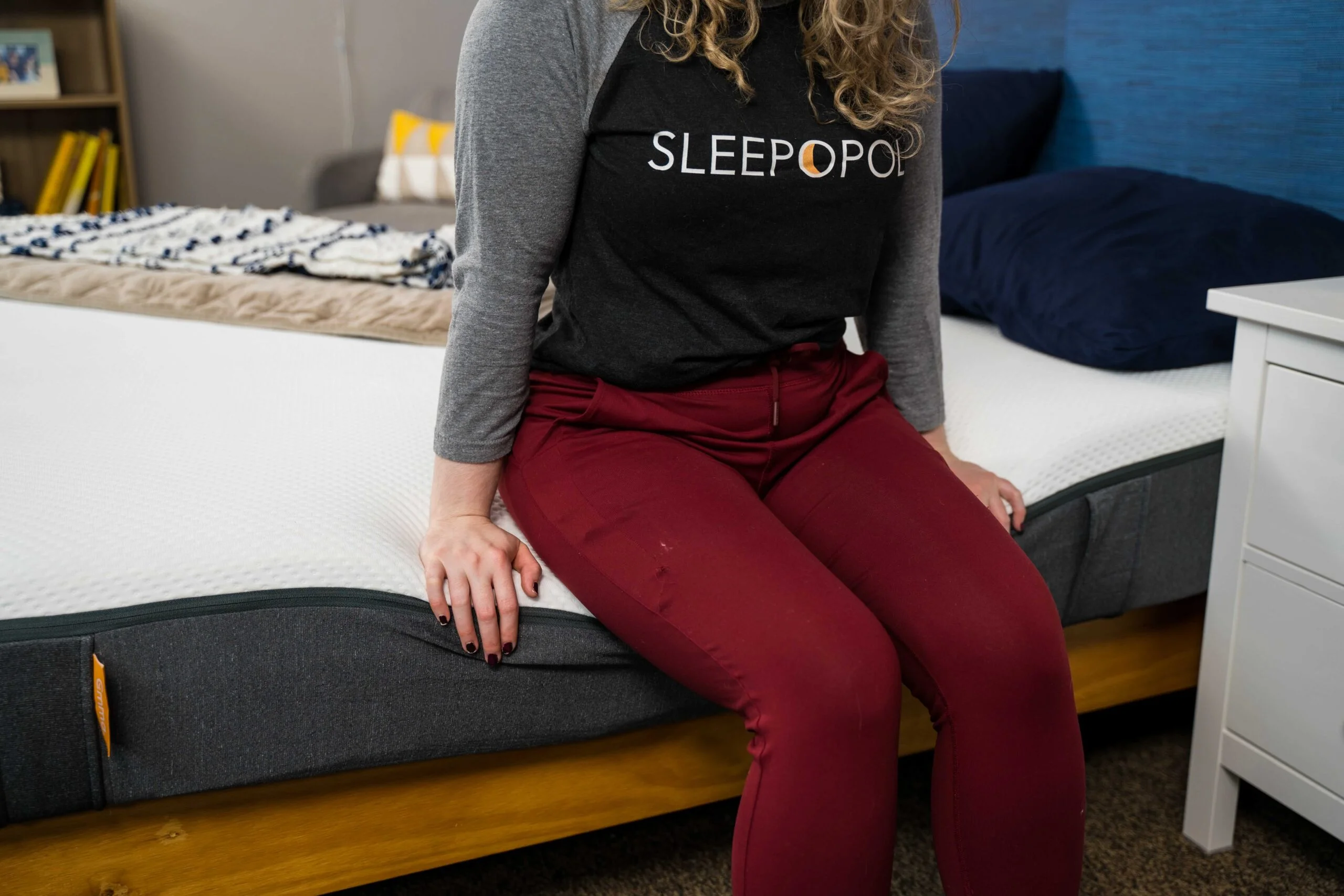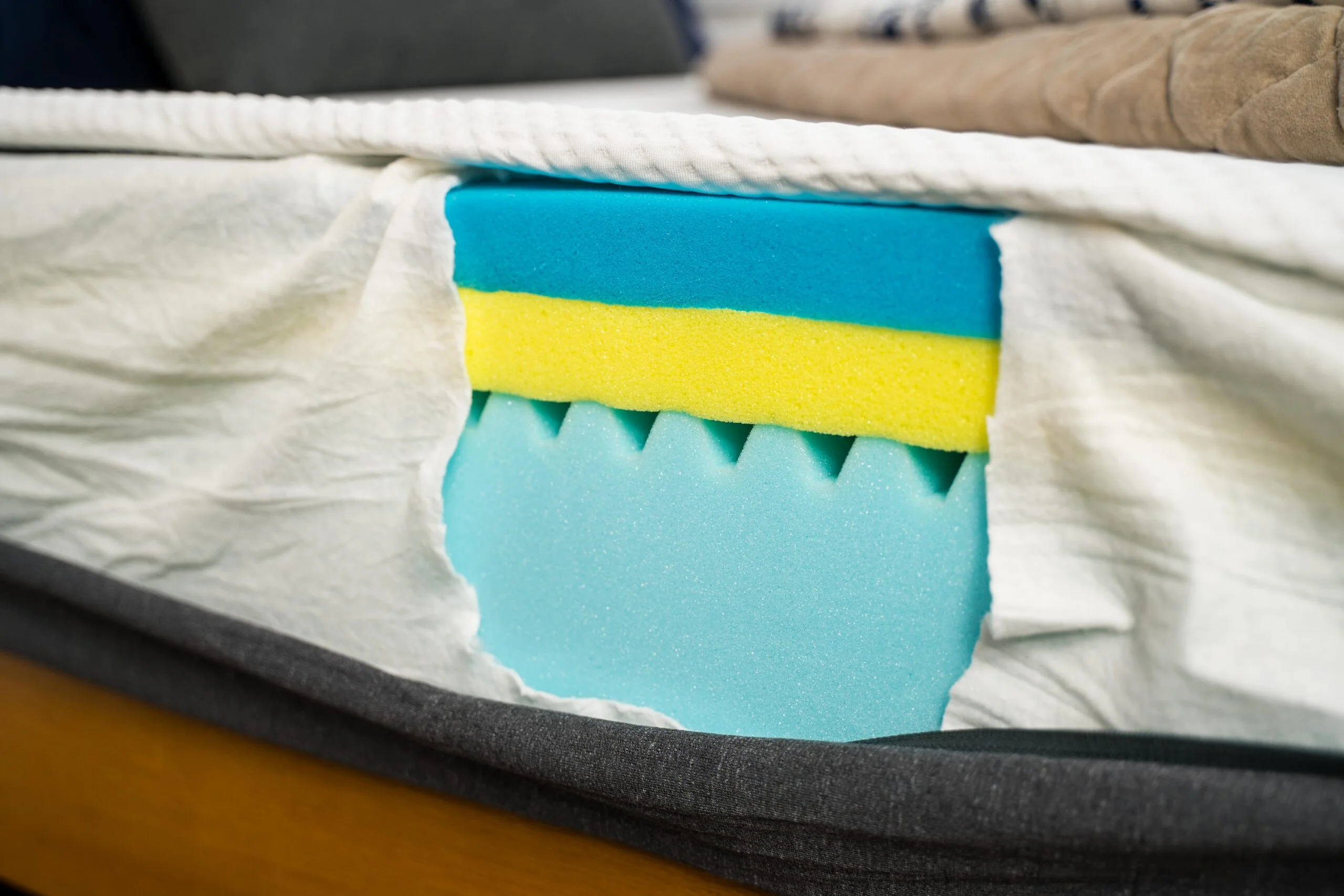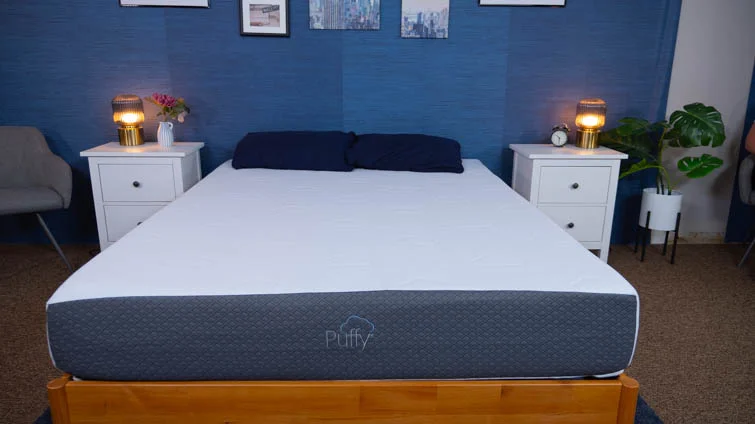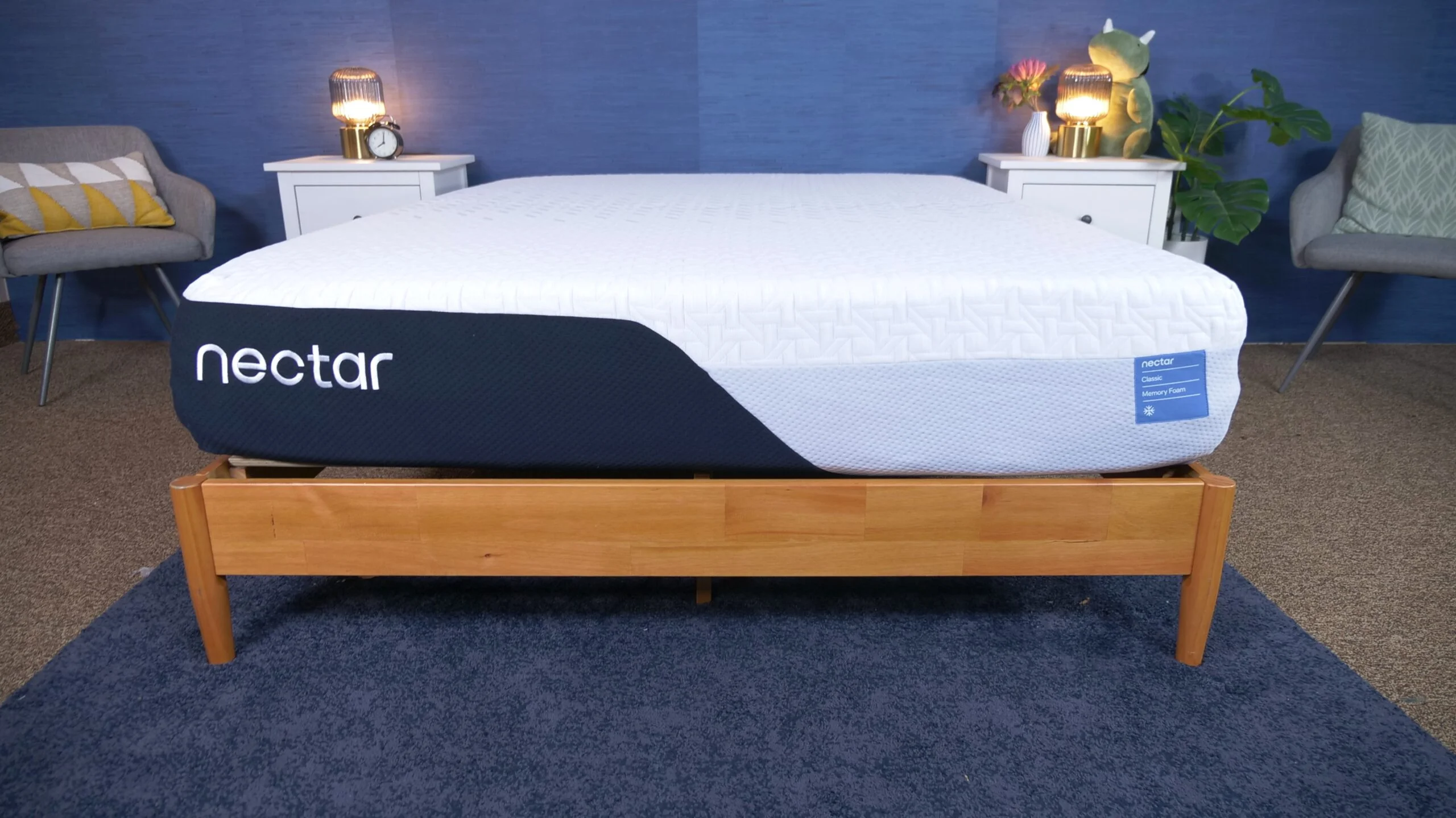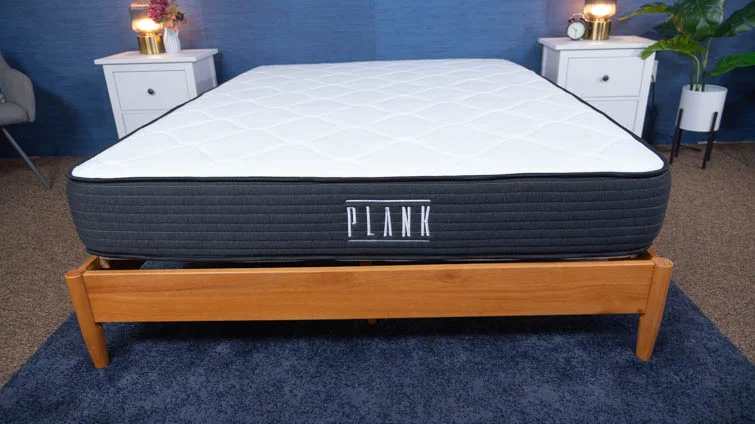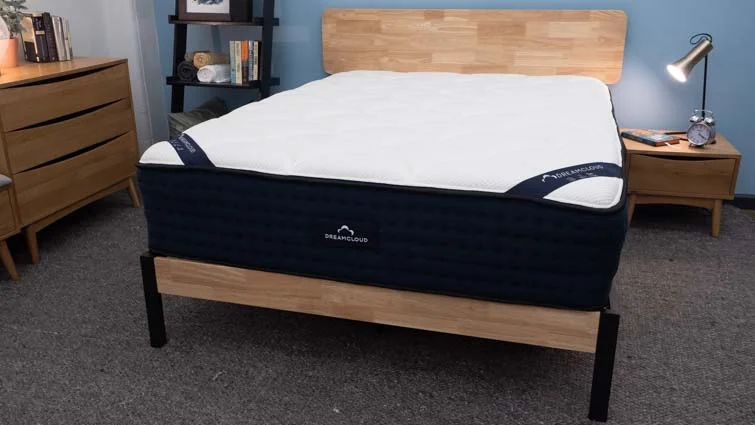Note: Emma mattresses have been discontinued in the U.S. You can still check out the brand on our best mattress in Canada page.
Today, we’re going to explore the original all-foam mattress from European bedding brand Emma. Designed by German engineers, this bed combines foams and nifty zoned support channels. This construction creates a sleeping experience that’s supportive, but with a touch of luxurious pressure relief.
However, we wouldn’t be doing our jobs if we didn’t run the Emma mattress through Sleepopolis’ series of tried and true tests. These evaluations are especially important for the Emma mattress, since the bedding brand recently updated their flagship bed with some exciting new changes. Our test results should tell us if the Emma mattress is worth the hype, and whether or not it’s the right bed for you. From firmness level to motion control, breathability to bounce, keep reading to find out all you need to know about the original Emma mattress.
Don’t have time to read it all? Click here to skip to the bottom and check out my review summary.
The Emma mattress is an all-foam bed, meaning that it includes four layers of foam in its construction and it doesn’t include any coils or springs. However, these are not all layers of memory foam (which you might have been thinking). Instead, the Emma uses Point Elastic Airgocell foam, HALO memory foam, and HRX (High Resiliency Extra) Supreme Foam throughout its build. These dense foams create a firm mattress, which is actually uncommon for this kind of bed. Because of this firmness, the Emma is a good fit for back, stomach, and combination sleepers who like more of an “on top” feel to their mattress. Check out more in our video review.
What our tester says:
“I think the Emma is a great choice for back sleepers. Although this is an all-foam mattress, it should have the right combination of comfort and support that these folks need. Stomach sleepers should also find the support they need.” – Nichole Mondshein, lead reviewer and staff writer
Emma Mattress Overview
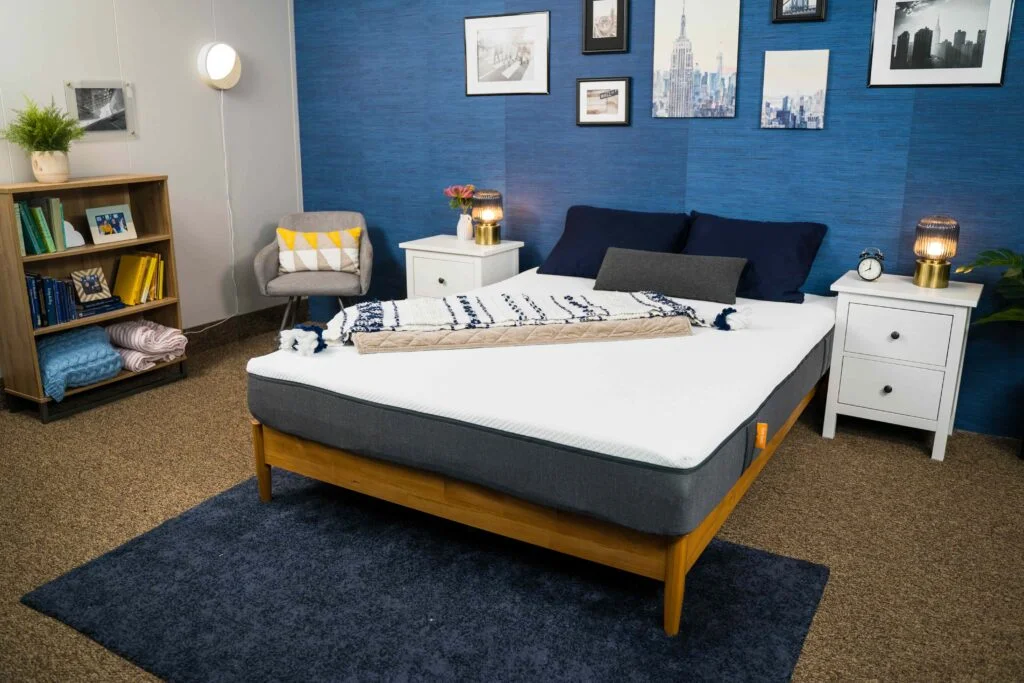
Let’s hit the ground running with some of the basics about the Emma to help you decide if it’s the best mattress for your weight, height, and preferred sleeping position. The Emma mattress is an all-foam bed, meaning that it includes four layers of foam in its construction, but doesn’t include any coils or springs. However, these are not all layers of memory foam (which you might have been thinking). Instead, the Emma uses Point Elastic Airgocell foam, HALO memory foam, and HRX (High Resiliency Extra) Supreme Foam throughout its build. These dense foams create a firm mattress, which is actually uncommon for this kind of bed.
Because of this firmness, the Emma is a good fit for back, stomach, and combination sleepers who like more of an “on top” feel to their mattress. While the Emma isn’t super pressure relieving, it does still contain a level of body contouring and comfort from its memory foam support layer. The Emma is also a bed-in-a-box mattress, so it does have an unboxing and off-gassing period. However, this should only take about 24–48 hours, and the off-gassing odor should dissipate, as long as you leave your mattress is a well-ventilated room when it first arrives.
Emma Mattress Review Video
For each mattress that we review on the Sleepopolis site, we like to put together a video of our mattress testers actually opening, lying down on, and giving their thoughts on the specific bed. Below, you can watch me review the Emma mattress. Its scores in individual categories such as materials, motion isolation, edge support, and more are listed at the end, and I’ll also outline some of them them down below for easy viewing. Overall, the Emma mattress scored a 4.1 out of 5 after I combined and averaged all of its individual scores.

Emma Mattress Sleepopolis Score
As you can see, the Emma mattress scored lowest on materials and warranty. In terms of materials, the Emma does not use any materials that are specifically eco-friendly. The Emma also has a 10-year warranty, but ideally, we’re looking for a mattress with a lifetime warranty. For options that scored higher in some of these categories, see our best organic mattresses and best mattresses that won’t sag (many of the latter have a lifetime warranty, or at least one that’s longer than 10 years).
Emma Hybrid Comfort Mattress Specs
| Material | Hybrid |
| Price (Queen) | $1,539 (before discounts) |
| Firmness | Firm (7.5/10) |
| Shipping | Free Shipping |
| Sleep Trials | 365 nights |
| Warranty | 10 Year Warranty |
| Height | 13″ |
| Adjustable Base Compatible? | Yes |

The Emma mattress is made of a mix of Airgocell foam, memory foam, and dense poly foam to provide sleepers with deep pressure relief, body contouring, and sinkage. Additionally, the Emma includes zoned support sections built into these foam layers that help to balance all that softness with some necessary structure. This adds some durability and support to this mattress, helping this bed to stand the test of time. Let’s take a closer look at these individual layers, one by one.
Emma Mattress Firmness
One of the most important factors that goes into buying a new mattress is firmness level, which corresponds to the initial feeling you experience when you first lie down.
During this section, it’s important for sleepers to keep in mind that firmness is very subjective, and is usually based on your individual weight, height, body type, or preferred sleeping position. Just because I rate this mattress at a certain score doesn’t necessary mean that you’ll feel the same way sleeping on it.
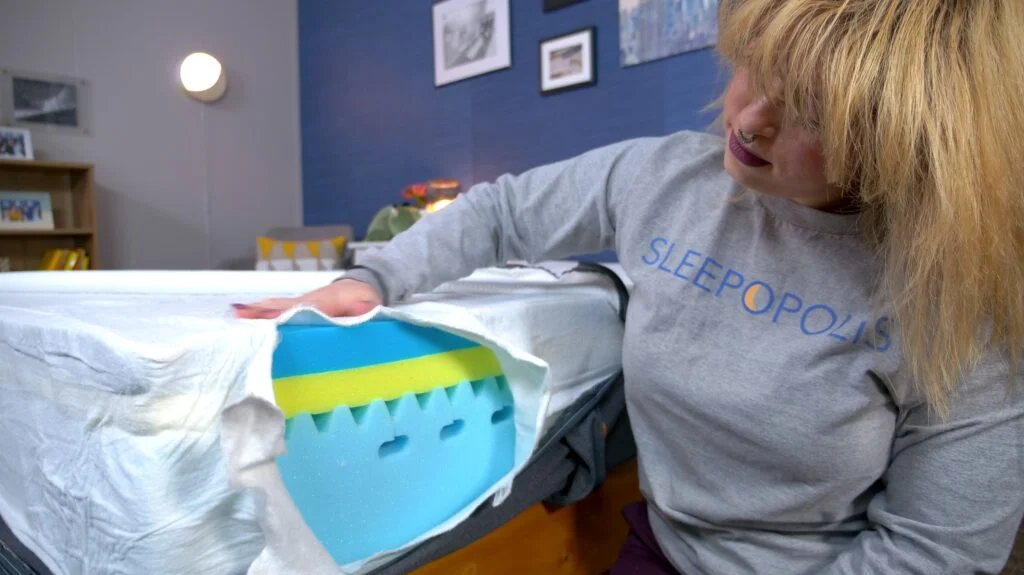
Because of this subjectivity, here at Sleepopolis, we like to have multiple employees test out the mattress in question before we give it its final firmness score. To do this, we have each mattress tester lie down on the bed separately and then give it a score from 1 to 10. A score of 1 means that the bed is extremely soft, while a score of 10 means that it’s extremely firm. Then, we average these ratings together to get the final firmness score of the bed.

While the Emma is all-foam mattress, which usually equates to it being softer than an innerspring or hybrid bed, its ergonomic layer creates a lot of support that help to keep sleepers’ spines in a neutral alignment. These layers of dense foam can be felt when lying down on this bed, which is why I scored the Emma at a 7 out of 10. The industry standard for a medium-firm mattress is set at a 6.5 on the firmness scale, so the Emma is slightly firmer than this average.
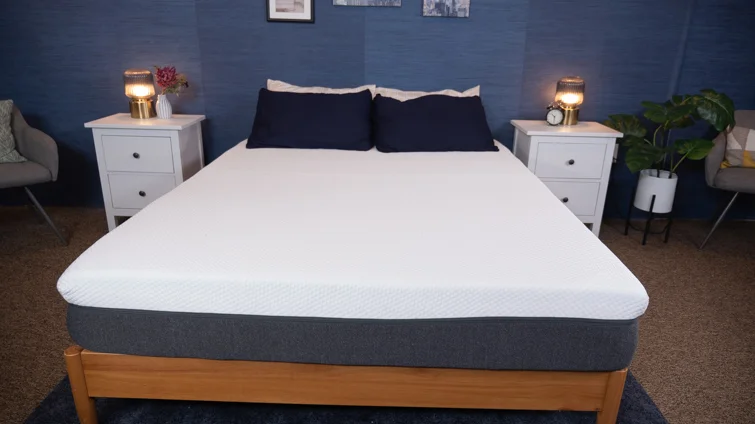
Emma Mattress

Product Details
Our Recommendation
Financing Options
Financing options are available for this mattress.
Sleeping Position and Body Weight
We recognize that people come in all shapes and sizes, and people of every size deserve a mattress that works for their body type. We use the weight categories light, average, and heavy to more easily categorize sleepers based on how mattresses will perform for their body type, as most mattresses are designed for the group we call “average” (59 to 113 kilograms, or 130 to 250 pounds).
As a general rule, lighter sleepers don’t require as much support as average weight sleepers, and mattresses will tend to feel firmer to them. On the other hand, heavy sleepers tend to need more support than average weight sleepers and tend to sink into the mattress more.
As far as sleeping positions go, side sleepers tend to need a softer mattress while stomach sleepers usually need a firmer, more supportive one. Back sleepers are usually somewhere in the middle.
Is the Emma a Good Mattress for Back Sleepers?
- Light Back Sleepers (under 59 kilograms / 130 pounds) – Light back sleepers tend to feel mattresses as a bit firmer than advertised. So, this bed would most likely be a good option for these folks, as long as they like something firm.
- Average Weight Back Sleepers (59–113 kilograms / 130–250 pounds) – I think average weight back sleepers will be most comfortable on this mattress. The dense poly foam and Airgocell foam included in the construction should create a balanced feel.
- Heavy Back Sleepers (over 113 kilograms / 250 pounds) – Heavy sleepers of all sleeping positions will most likely not receive the support they need from the Emma mattress. These sleepers should opt for a firmer and more supportive bed, which they should be able to find in our roundup of the best mattresses for heavy people. I’d also recommend that these customers also check out the Emma brand’s latest mattress: the Emma Hybrid Comfort. I found this mattress to be much better suited for heavier folks. Learn more in our full review.
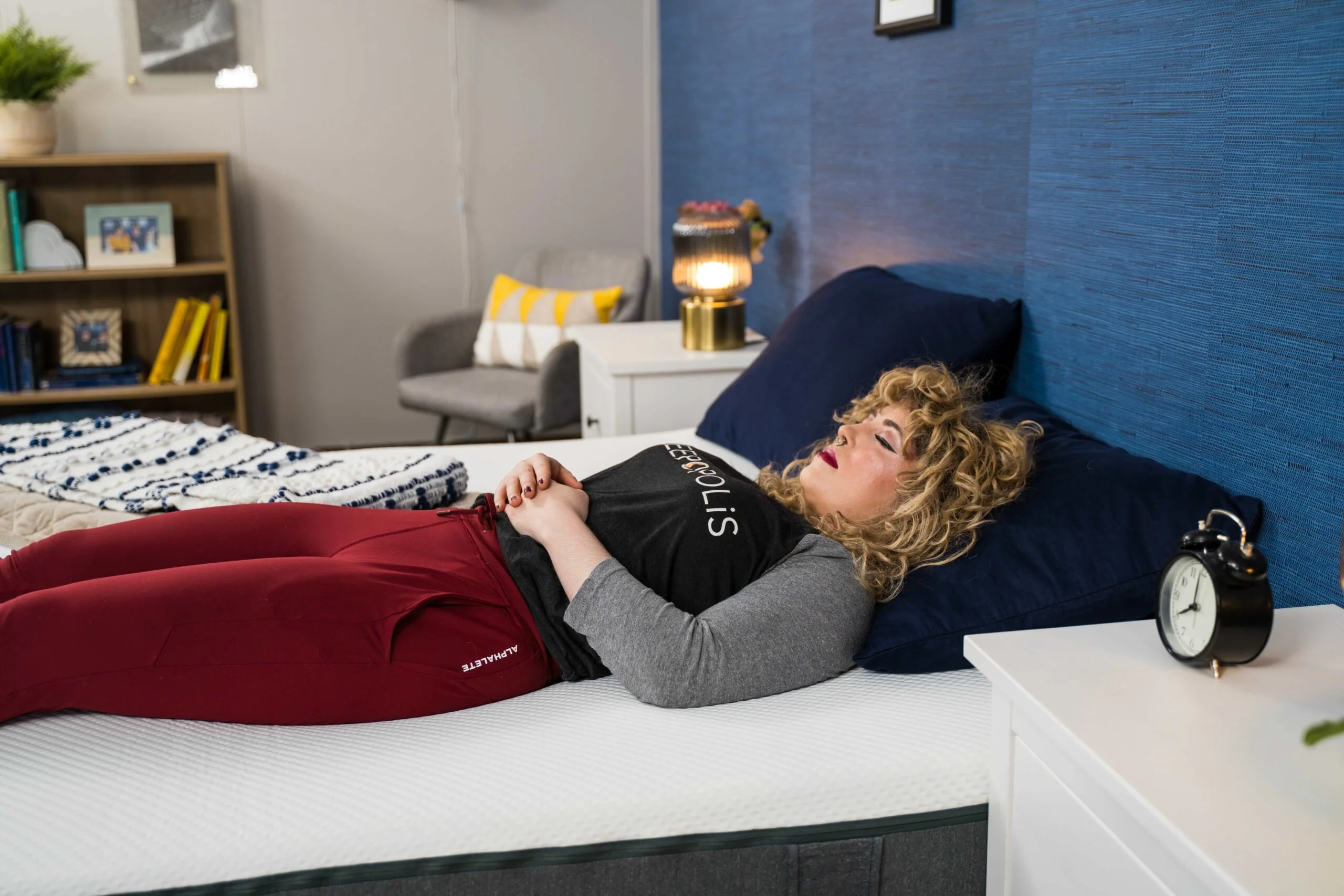
Is the Emma a Good Mattress for Side Sleepers?
- Light Side Sleepers (under 59 kilograms / 130 pounds) – I think this bed may be too firm for these sleepers, since they are going to need more body contouring around their hips and shoulders. Instead, these sleepers can check out our roundup of the best mattresses for side sleepers.
- Average Weight Side Sleepers (59–113 kilograms / 130–250 pounds) – Some of these sleepers may feel comfortable on this bed due to the zoned construction that allows softness beneath the shoulder. However, I don’t think the Emma is the best fit for this sleeping position overall. Most side sleepers need a mattress with more contouring around their shoulders and hips.
- Heavy Side Sleepers (over 113 kilograms / 250 pounds) – As I discovered while back sleeping, heavy sleepers of any sleeping position aren’t likely to be comfortable on the Emma.
Is the Emma a Good Mattress for Stomach Sleepers?
- Light Stomach Sleepers (under 59 kilograms / 130 pounds) – Light stomach sleepers should be comfortable while resting on the Emma mattress. The firmness of this bed means that these sleepers should be getting even more support than average weight or heavier sleepers.
- Average Weight Stomach Sleepers (59–113 kilograms / 130–250 pounds) – The Emma is a good fit for average weight stomach sleepers. While that may sound unusual for an all-foam mattress, the Emma is much firmer than many of the other foam beds currently on the market. Plus, the zoned support included in the base layer of this mattress goes a long way toward keeping the hips elevated — something that is essential for anyone in the prone position.
- Heavy Stomach Sleepers (over 113 kilograms / 250 pounds) – Of all the sleeping positions, stomach sleepers need the most support, and this is even truer for heavy sleepers over 250 pounds. They’re not likely to find what they need on the Emma.
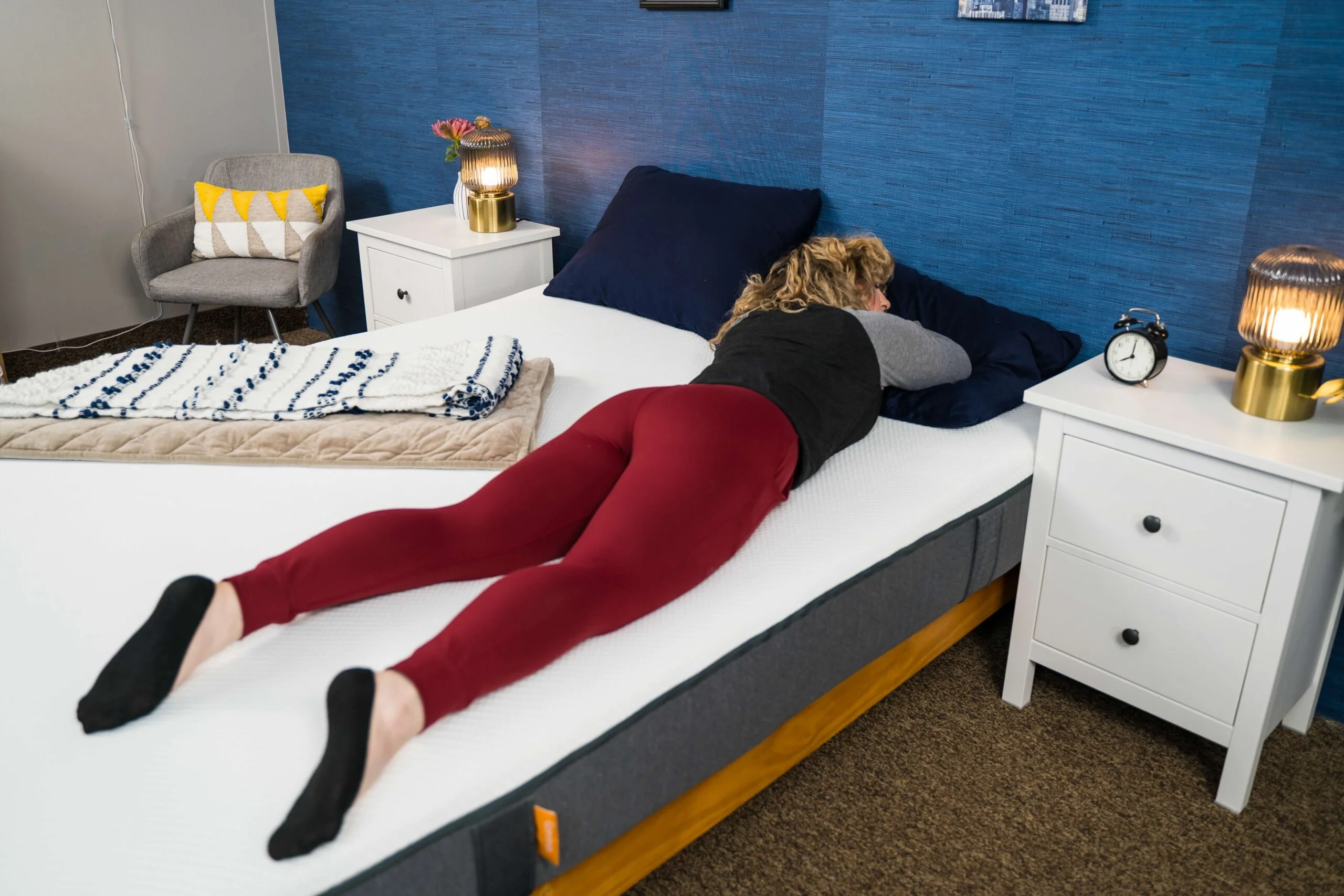
Emma Mattress Performance
To really determine whether a bed is the best match for your personal needs and preferences, it’s important to consider not just firmness, but also how the mattress performed in different sleeping positions, how it relieved pain and pressure, and how it might feel to couples sharing the bed. Because of this, I put each of our mattresses through a series of tests to get more of an all-around view of how they would work for individual sleepers, helping me to decide what kinds of sleepers will (or won’t) be comfortable on these beds. Keep reading to see how the Emma mattress stacked up in these categories.
Emma Mattress Pain Relief Performance
Something important to consider in any mattress purchase is how the bed responds to pressure points along the body while you’re resting on it. Side sleepers tend to feel the most pressure, as they spend the majority of the night lying on their hips and shoulders. However, back and stomach sleepers could also feel pressure in these areas, as well as around the lumbar region. Because of this, all sleepers are going to want to check out how well a certain mattress provides relief.
To measure pressure relief on the Emma mattress, I placed a pressure map on top of the bed and then lied down in different sleeping positions (including side and back sleeping). This map is able to detect where my body exerted the most pressure on the bed, and then it creates a colorful graphic depicting how my body was interacting with the structure in real time. Blue and green indicate areas of low pressure, while yellow, orange, and red demonstrate areas of high pressure.
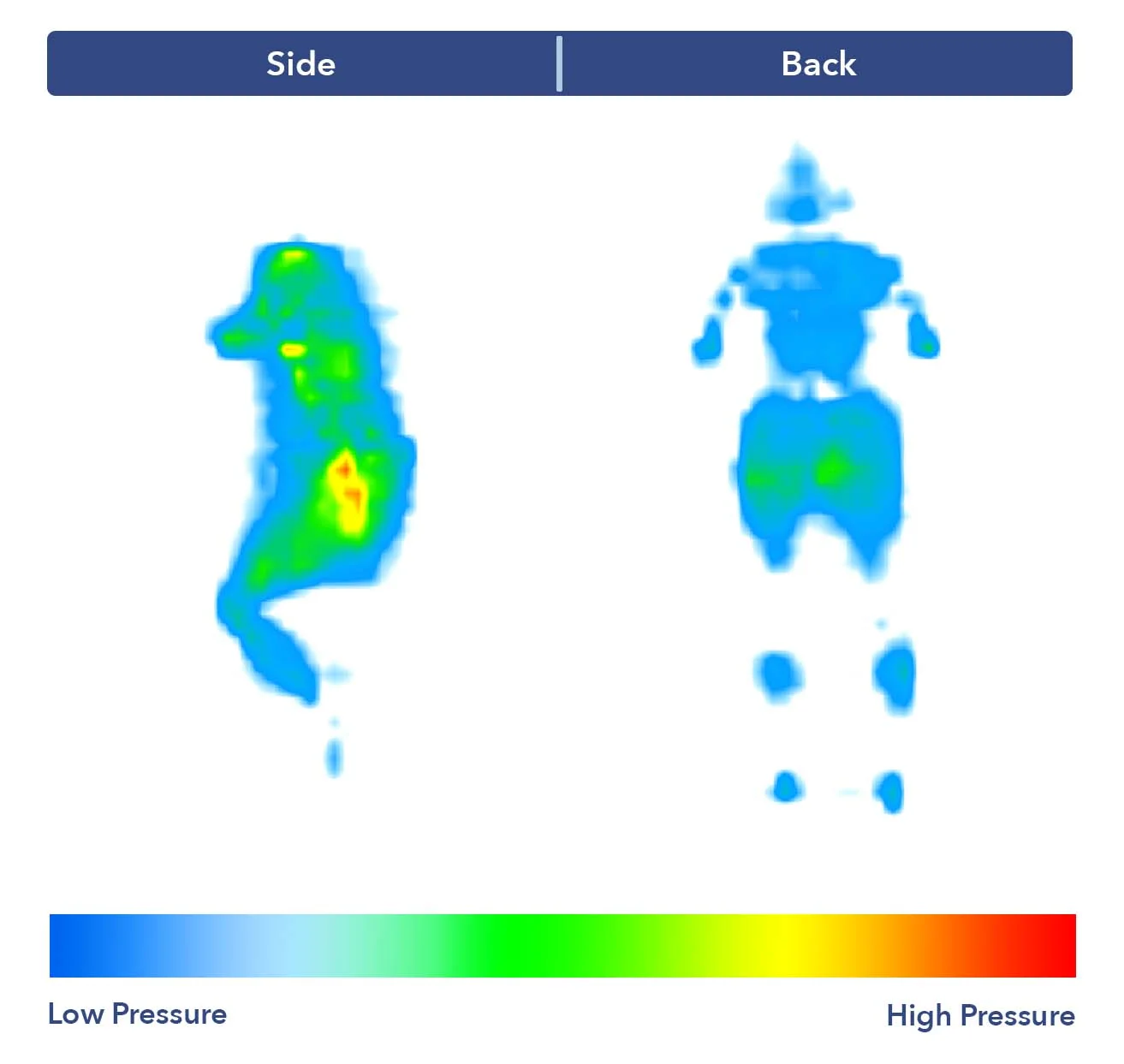
One thing to note: you should always take your sleeping position into account before buying a mattress based on its pressure-relieving capabilities. As we’ve stated previously, the Emma mattress is most likely not the best bed choice for side sleepers in the majority of weight categories. If you’re a side sleeper, you’re probably going to want to avoid this bed, despite any positive signs in its pressure-map results. Check out more side sleeper options in our best mattress for side sleepers page.
From these results, you can see that the Emma mattress does a fantastic job alleviating back pain. The memory foam in the support layer is adept at contouring and filling in the space around the lumbar region, while the zoned support in the foundation layer helps to keep sleepers’ spines in a neutral alignment. However, there was some yellow and red present around the hips and shoulders on the Emma mattress while side sleeping. If you’re a side sleeper, this means that you might feel pressure around these areas, which could lead to soreness or pain. However, back sleepers shouldn’t feel this pressure in these areas.
Motion Transfer
No review would be complete without a good old-fashioned motion-transfer test. If you’ve previously slept in a bed with a partner or a pet, you’ll know how frustrating it can be to wake up to the tossing and turning of others. That’s exactly what I evaluate — how much movement is able to travel from one side of the mattress to the other.
Human Test
First, I lie down next to a colleague, move around on the mattress, and see how much of each other’s movements we are able to feel. I could feel my coworker Corey getting in and out of bed, but his movements didn’t shift me around too much.
Water Test
Next, I place a full water glass on the bed and roll around again, seeing how much the liquid moves around with us. I noticed the water sloshing around a bit when I got in and out of bed, but not when I was just rolling around.

Seismometer Test
Finally, I drop a 10-pound steel ball from heights of four inches, eight inches, and 12 inches, and measure the disturbance it causes using a seismometer. The bigger the lines that the seismometer records, the more movement you’re likely to feel from the opposite side of your mattress during the night.
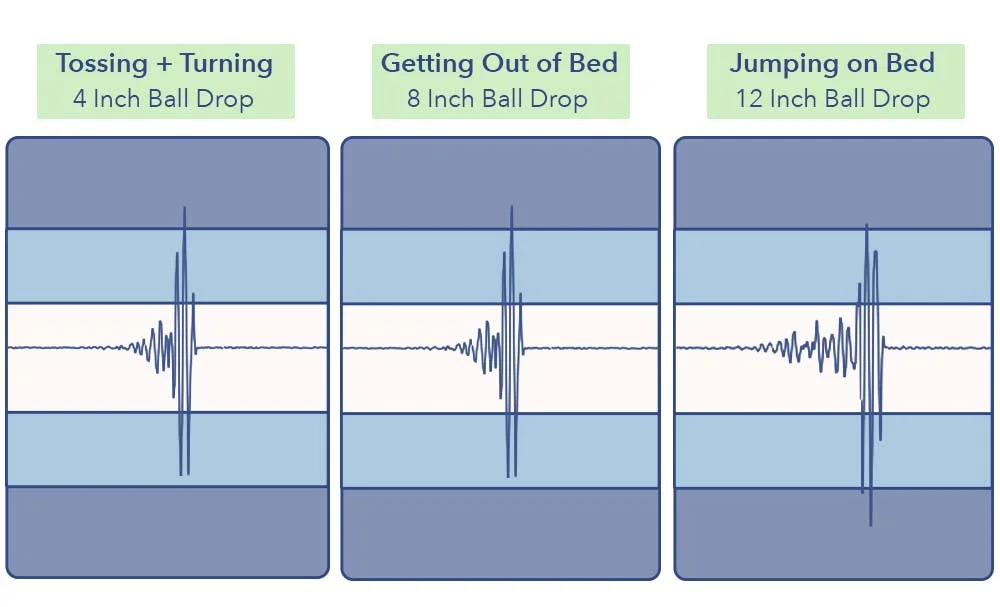
Those are very low vibrations on the seismometer — some of the lowest I’ve seen, in fact.
Motion Transfer
When combining the stellar seismometer results with the just-average results of the human test and the water test, I can say that the Emma mattress is pretty good at isolating motion. Most folks should be able to sleep on this bed with a partner without getting woken up by their tossing and turning.
Responsiveness
I test how responsive a mattress is by seeing how easy it is to roll around on it. Typically, memory foam beds are the least responsive, and hybrid mattresses (those with coils) are the most responsive. Couples should keep in mind that the more responsive a mattress is, the better it is most like to be for sex, since it makes it easier to move around and change positions on top of the bed.
Even though the Emma is memory foam mattress, its dense foams and zoned support give it more of an “on top” feel to it, rather than that “stuck” feel that’s common with foam beds. Because of this, it’s very easy to move around and switch positions on top of the Emma during the night, making it a good choice for both combination sleepers and couples (for obvious reasons).
Responsiveness
For an all-foam mattress, the Emma is exceptionally responsive. The only reason I didn’t give it a perfect 5 is that foam can lose its responsiveness over time when compared to coils. But overall, you should find it very easy to move around on the Emma.
Cooling
When I determine how cooling a mattress is, I start our by taking a look at what it’s made of. Innerspring and hybrid beds are usually the most cooling mattresses, since the coils used in their construction add some breathability and airflow to these beds. However, even all-foam mattress can be cooling if their cover or foam layers include Tencel or gel infusions in them.
Memory foam mattresses have a reputation for overheating, but the Emma aims to change that. It includes a breathable cover and Airgocell poly foam with an open-cell structure in its comfort layer to promote airflow and regulate your temperature. To see if these features actually work, I used a thermal gun to measure how much the Emma heated up after I laid on it for five minutes.
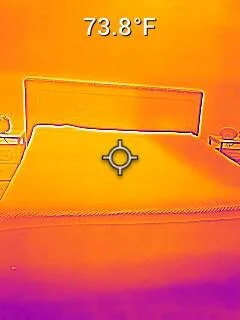
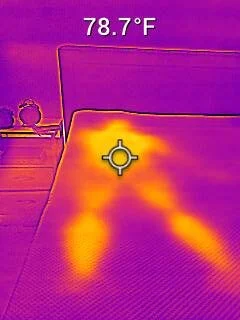
As you can see above, the temperature only increased by about 5 degrees, indicating good cooling abilities.
Cooling
I ultimately gave the Emma a 4.5 out of 5 on cooling, but it’s important to remember that this score is within the context of it being a memory foam mattress. While the Emma sleeps cooler than many other foam beds, it still may sleep hotter than an innerspring or hybrid mattress. If you’re an especially hot sleeper, you might still want to take a look at our roundup of the best cooling mattresses.
Edge Support
If you’re an active sleeper and tend to move around a lot throughout the night, you’re definitely going to want to check out how much edge support your mattress has. Edge support measures whether or not the sides of your mattress are as supportive as the center. This is also an appealing characteristic for couples who want to take advantage of the full surface area of their bed, and heavier sleepers (those over 113 kilograms / 250 pounds) who want to prevent sagging in their mattress
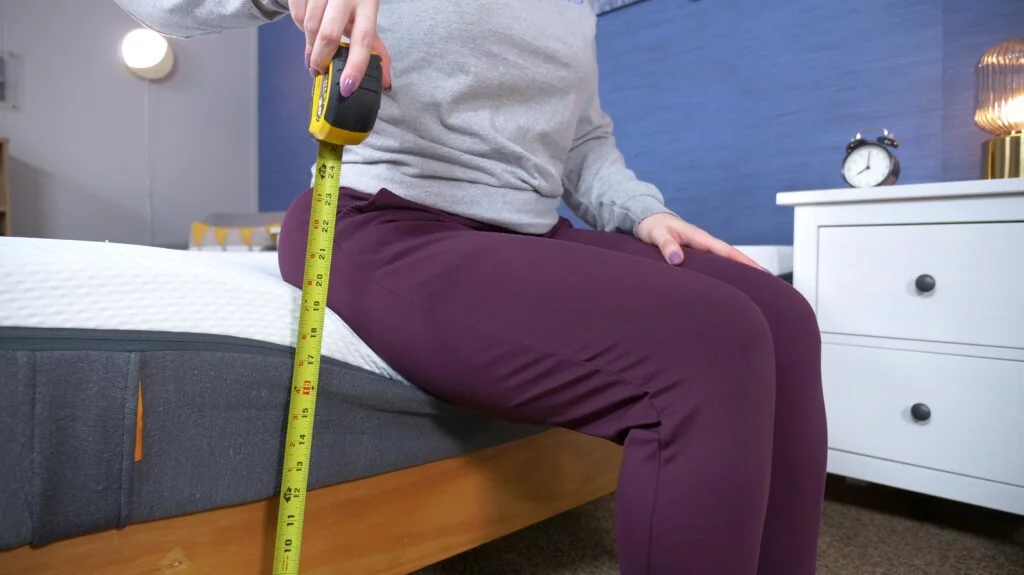
Lying on my back near the edge of the bed, I didn’t feel like the Emma mattress was collapsing under my weight. And when I determined how much sinkage there was with a tape measure, it only came out to half an inch. The only time I experienced significant sinkage when I was sitting on the corner of the bed.
Edge Support
All of the above data tells me that the Emma has pretty strong edge support. While sleeping, you should be able to spread out toward the sides of your bed without feeling like you’re going to fall off or sink too far into its layers.
Emma Mattress Performance for Couples
When sharing the bed with a partner, you’ll want to consider all of the traits listed above, including motion transfer, responsiveness, cooling capabilities, and edge support. The Emma mattress did pretty well in all of these categories.
This bed is especially responsive and cooling for an all-foam mattress, thanks to its firm feel and cooling cover. The Emma also had fairly strong edge support, which shows that couples should be able to spread out and use the full surface area of their mattress without worrying about sinkage or sagging near the sides. And as I already covered, it has very low motion transfer.
Couples
After averaging the scores of the above categories (motion transfer, responsiveness, cooling, and edge support), the Emma earned an overall score of 4.1 for couples. With all of that in mind, I think that it’s a good option for anyone who shares their bed with a partner. In fact, the Emma often makes our roundup of the best mattresses for couples.
Durability
When I evaluate a mattress’s durability, I take a close look at four key elements: materials, support, edge support, and warranty. If a mattress excels in these areas, there’s a high chance that it will last for many years to come. The Emma mattress is made from two layers of proprietary foam and an HRX Supreme foam foundation layer. These materials are of good quality, but none of them are specifically eco-friendly. I gave the bed a score of 3.5 out of 5 for materials because I don’t see the mattress lasting a lifetime. This speculation is confirmed by Emma’s 10-year warranty, which means Emma will not be liable for the condition of the bed after 10 years. While not a lifetime warranty, 10 years is still pretty average, so I gave the warranty a score of 3.5 out of 5.
When it comes to support and edge support, I gave these categories a score of 4 out of 5. I found this bed to be quite supportive due to its firm feel that keeps the sleeper lifted. Without the use of coils or reinforced edges to maintain structural integrity, I couldn’t score the bed any higher. When I average these scores, the overall Emma durability score is a 4 out of 5, meaning it’s a pretty durable mattress.
| Overall Durability Score | 4/5 |
| Materials Score | 3.5/5 |
| Support Score | 4/5 |
| Edge Support Score | 4/5 |
| Warranty Score | 3.5/5 |
Company Information
Customer Service Information
Hours of operation: Monday-Friday 8:00 to 18:00 GMT-6
Contact Information
- Phone: 1 (855) 580 EMMA
- Email: support@emma-sleep.com
- Chat: Available online Monday-Friday 8:00-18:00 GMT-6
Visit in person: Locate a store near you
Payment Options
Emma accepts various payment methods such as Visa, Mastercard, American Express, Discover, PayPal, Apple Pay, and more. Financing options are also available through Klarna.
My Final Thoughts About the Emma Mattress
Now that I’ve fully explored the Emma mattress on a granular level, let’s recap some of my favorite things, as well as my complaints, to get to the bottom of the final question: Is the Emma mattress the best fit for you?
Who I Recommend the Emma Mattress For
- I think the Emma is a great choice for back sleepers. Although this is an all-foam mattress, it should have the right combination of comfort and support that these folks need.
- Stomach sleepers should also find the support they need from the Emma mattress. This is an especially impressive feat for an all-foam bed, but the dense layers of foam in the construction give it the firmness that it needs to keep these sleepers’ hips in line with their shoulders, promoting a healthy spinal alignment.
- The Emma is also a strong option for combination sleepers due to its responsiveness. The “on top” feel of this bed makes sure that combination sleepers are able to move around and switch positions during the night without getting “stuck” in this mattress.
Who I Don’t Recommend the Emma Mattress For
- The Emma is most likely going to be too firm for most side sleepers. These folks are going to need more pressure relief around their hips and shoulders than the Emma is able to provide.
- Heavier folks probably won’t find enough support on this all-foam bed, either. These sleepers are most likely going to want to check out our roundup of the best mattresses for heavier sleepers to find a bed that is able to support them and last the test of time.
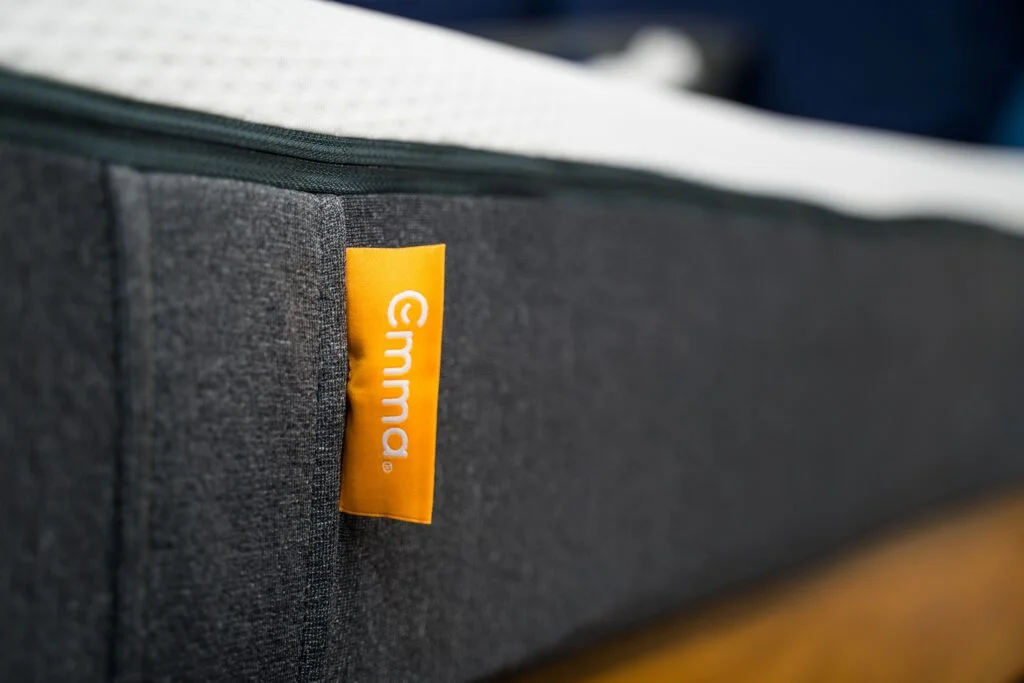
Emma Mattress Pricing and Sizing
Think the Emma might be the mattress you’ve been searching for? Take a peek at the size and pricing information for this mattress in the table below. And don’t forget to click on one of the coupons in this article for a nice discount.
Prices listed below will be before discount or offer for each size.
| Size | Dimensions | Price |
|---|---|---|
| Twin | 38” x 75” x 12” | $799 |
| Twin XL | 38” x 80” x 12” | $899 |
| Full | 54” x 75” x 12” | $1,099 |
| Queen | 60” x 80” x 12″ | $1,299 |
| King | 76” x 80” x 12″ | $1,449 |
| California King | 72” x 84” x 12″ | $1,449 |
Emma Mattress Frequently Asked Questions
Does the Emma mattress come with a sleep trial?
The Emma mattress comes with a 365-night trial period.
Does the Emma come with a mattress warranty?
Yes! Your new Emma mattress will come with a 10-year warranty.
How does the Emma mattress ship?
The Emma is a bed-in-a-box meaning that it will ship straight from the warehouse to your front door. Emma offers free shipping via UPS and FedEx.
What are customers saying about the Emma Original?
“Very fast shipping and super comfortable mattress! Like sleeping on a cloud! Back discomfort practically disappeared in a month of use! Absolutely recommended the purchase!” – Gloria
“Very hard, despite having requested and obtained a soft layer even if not the correct size…in this heat, I am finding that the mattress is not cool at all. Overall, I am not very satisfied with the purchase and I think that, later, I will have to buy a new mattress.” – Gianluca
“After the first mattress didn’t thicken, we got a new one quickly and easily. We use the mattress in our caravan and are very content with it.” – Vanessa K.
Emma Mattress Vs
If you’re interested in the Emma, there’s a good chance you’re also looking at some of its main competitors. Let’s take a quick look at some other mattresses that compete with the Emma, and define their similarities and differences to figure out which one is the best for you.
- Puffy Cloud Mattress – Cloud-like softness
- Nectar Mattress – Thick and contouring memory foam
- Brooklyn Bedding Plank Firm Mattress – Dual-sided firmness
- DreamCloud Original Mattress – Stronger cooling abilities
- Emma Hybrid Comfort – Firmer hybrid upgrade
| Rating | ||||||
|---|---|---|---|---|---|---|
| Firmness | Firm: 7/10 | Medium-soft: 6/10 | Medium-firm: 6.5/10 | Multiple firmness options | Medium-firm: 6.5/10 | Firm: 7.5/10 |
| Material | Foam | Foam | Foam | Foam | Hybrid | Hybrid |
| Cooling | — | — | — | — | ||
| Best For | Back Sleepers, Hot Sleepers, Kids | Side Sleepers, Back Sleepers, Back Pain, Kids | Side Sleepers, Back Sleepers, Stomach Sleepers, Back Pain, Couples | Back Sleepers, Stomach Sleepers, Back Pain, Seniors | Back Sleepers, Stomach Sleepers, Hot Sleepers, Seniors | Back Sleepers, Stomach Sleepers, Couples |
Emma vs Puffy
Both the Emma and the Puffy Cloud are all-foam mattresses, making their constructions very similar. However, because the Emma includes dense foams with zoned support, it’s firmer then the Puffy Cloud, scoring a 7 on the firmness scale, while the Puffy Cloud scored a 6. Because of this, the Puffy Cloud has more pressure relieving capabilities and a “sinking” feel to it, while the Emma mattress is more durable and has an “on top” feel to it.
- Price: The Emma mattress and the Puffy Cloud mattress are very similar in price, with a queen sized Emma costing $1,299 and a queen sized Puffy Cloud costing $1,249.
- Sleeping position: The Puffy Cloud has more pressure-relieving capabilities than the Emma mattress, so it’s a better fit for side sleepers. However, the firmness of the Emma makes it a better option for stomach, back, and combination sleepers.
- Cooling: Both the Puffy Cloud and the Emma are all-foam beds, so they have similar cooling capabilities.
- Body weight: Neither the Emma or the Puffy Cloud are firm enough to support heavier sleepers (those over 113 kilograms / 250 pounds). Instead, these sleepers can check out our roundup of the best mattresses for heavy people.
Check out our full Puffy Cloud mattress review to learn more.
Emma vs Nectar
The Nectar has five inches of memory foam, giving it that deep sinkage feel and lots of pressure relief. In contrast, the Emma — also a foam mattress — is very supportive, and does not allow for as much sinkage. Because of this, the Nectar is a better fit for side sleepers, while the Emma works better for back and stomach sleepers.
- Price: The Nectar is less expensive than the Emma. A queen sized Nectar mattress costs around $999, while a queen sized Emma mattress costs around $1,299.
- Sleeping position: As I stated above, the amount of memory foam included in the Nectar makes it especially pressure relieving. Because of this, side sleepers are probably going to be more comfortable on the Nectar, since they won’t feel as much pressure around their hips and shoulders. I’d recommend that stomach sleepers stick with the Emma to make sure that their spine stays in a neutral alignment.
- Cooling: The Nectar does include a gel-infused layer of comfort foam near the top of its layers, but it is definitely not the most cooling mattress on the market. The Emma has the edge here.
- Body weight: Once again, neither the Nectar nor the Emma provides enough support for heavier sleepers (those over 113 kilograms / 250 pounds).
For more information, check out our full Nectar mattress review.
Emma vs Plank Firm
While both of these mattresses are constructed entirely of foam, the main difference between the Emma and the Plank Firm is that the latter is flippable — it has both a Firm side and an Ultra Firm side. The Firm side of the Plank Firm scored a 7.5 on our firmness scale, while the Ultra Firm side scored a 8.5. Both of these scores are much higher than the industry standard for a medium-firm bed (set at a 6.5 on the firmness scale), so the Plank Firm is especially helpful for stomach and heavier sleepers (those over 113 kilograms / 250 pounds). While the Emma also works well for these sleepers, it did score slightly lower on our firmness scale — something to keep in mind if you’re especially concerned about your mattress sagging or not being durable enough to support your body weight.
- Price: These mattresses are essentially the same price, with a queen sized Emma costing around $1,299, and a queen sized Plank Firm costing around $1,274.
- Sleeping position: Both the Emma and the Plank Firm are going to work best for back, stomach, and combination sleepers, as they both scored fairly high on our firmness scale. However, both sides of the Plank Firm are firmer than the Emma, so if you’re looking for a bed that’s especially durable and has a very “on top” feel to it, the Plank Firm is probably going to be the mattress for you. However, if you still want some pressure relief from your mattress, you may want to opt for the Emma.
- Cooling: The Emma does include cooling gel in its foam layers, which gives it a leg up on the Plank Firm. The Plank Firm does offer an additional top cooling panel that could be helpful for hot sleepers and couples, but it comes at an extra charge of $75.
- Body weight: The Plank Firm is definitely the mattress to opt for if you are a heavier sleeper (over 113 kilograms / 250 pounds). Because both sides of this mattress scored very high on our firmness scale, it proves that heavier sleepers shouldn’t have to worry about sinking into this bed’s foam layers.
Emma vs DreamCloud
The main difference between the Emma and the DreamCloud is their differing constructions; the Emma is an all-foam bed, while the DreamCloud is a hybrid mattress, so it includes layers of foam and individually wrapped coils. Usually, the addition of coils would add some firmness to a mattress, but the Emma and the DreamCloud actually both scored a 7 on our firmness scale, so they are very similar in terms of feel. However, the DreamCloud does have slightly better pressure map test scores, so it could be the stronger option for sleepers suffering from back or shoulder pain.
- Price: The DreamCloud is just slightly more expensive than the Emma. A queen sized Emma mattress costs around $1,274, while a queen sized DreamCloud mattress costs around $1,332.
- Sleeping position: Both of these mattresses are going to work best for back, stomach, and combination sleepers, and neither one is going to be soft enough for side sleepers of any weight class. However, the DreamCloud might work slightly better for combination sleepers than the Emma, since the inclusion of coils in its construction helps maintain a level of bounce and responsiveness that these sleepers need in order to switch positions easily during the night.
- Cooling: When it comes to cooling, the DreamCloud is definitely the way to go. This mattress includes gel inclusions in its foam layers, and the coils in its base layer help to add some breathability and airflow, preventing hot air from getting trapped throughout the night.
- Body weight: Neither one of these mattresses is a good fit for heavy sleepers (those over 113 kilograms / 250 pounds). While the DreamCloud could support heavy weight back sleepers who prefer a softer mattress, it’s still not supportive enough for the majority of sleeping positions.
Are you interested in the Emma brand but not the Emma Original mattress? Below, I’ll compare the Emma Original to the Emma Hybrid Comfort — the newest addition to the brand.
Emma’s Other Models
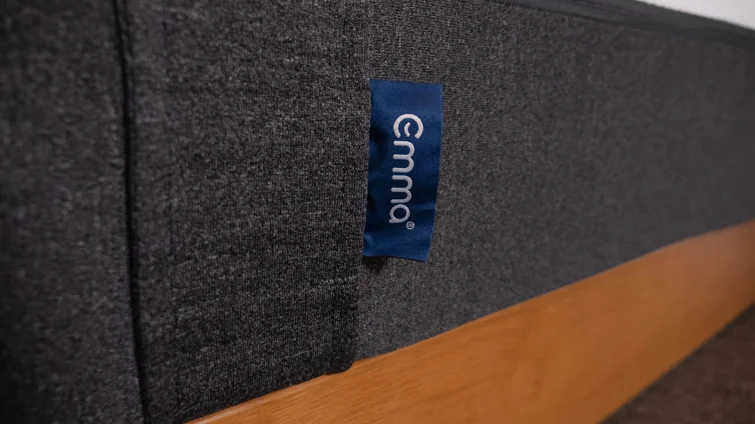
Emma Original vs Emma Hybrid Comfort
As you can tell from the name, the main difference between the Emma Original and the Emma Hybrid Comfort is their different constructions. While the Emma Original is an all-foam bed that mainly uses memory foam in its construction, the Emma Hybrid Comfort is — shocker — a hybrid bed, so it combines foam layers and pocketed coils. These coils add some durability to this mattress, as well as allowing for added breathability and airflow throughout the bed.
- Price: The Emma Hybrid Comfort is slightly less expensive than the Emma Original mattress. A queen sized Emma Hybrid Comfort costs around $1,199, while a queen sized Emma Original mattress costs around $1,299.
- Sleeping position: The Emma Hybrid Comfort is firmer than the Emma Original, so it works very well for back and stomach sleepers. While the Emma Original also works for these sleepers, if you’re worried about receiving enough support to keep your shoulders in line with your hips in order to promote a healthy spinal alignment, I’d recommend going with the Emma Hybrid Comfort.
- Cooling: The Emma Hybrid Comfort is going to be more cooling the the Emma Original because it’s a hybrid bed. The inclusion of coils in its construction allows for more airflow and breathability.
- Body weight: The Emma Hybrid Comfort is a much better choice for heavier sleepers (those over 113 kilograms / 250 pounds) because its firmness allows for it to be supportive enough for these folks. While heavy side sleepers may still want a bed with more pressure relief, heavy back and stomach sleepers should rest comfortably on the Emma Hybrid Comfort
To learn more about this bed, check out my full Emma Hybrid Comfort mattress review.
Our Review Process
At Sleepopolis, our team of Certified Sleep Science Coaches personally test each mattress. We start by unboxing the mattress to figure out how difficult (or easy) it is to get the mattress from the box to the bed. Then, we spend time laying on the bed in different positions, taking time to assess it on our backs, stomachs, and sides. Next, we perform our Sleepopolis tests, using specialized tools to measure qualities like motion transfer, bounce, and pressure relief. Our last step is to open up the mattress and take a look at each layer. These steps allow us to give our final verdict on the mattress.



























